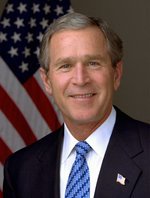Bush can't handle the truth
 NYDaily In one of the most intellectually incoherent major speeches ever delivered by a minor President, George W. Bush last week blamed "some Democrats and anti-war critics" for changing their minds about the war in Iraq and now saying they were deceived. "It is deeply irresponsible to rewrite the history of how that war began," the President said. Yes, sir, but it is even more deeply irresponsible to rewrite the history of how history was rewritten in the first place.
NYDaily In one of the most intellectually incoherent major speeches ever delivered by a minor President, George W. Bush last week blamed "some Democrats and anti-war critics" for changing their minds about the war in Iraq and now saying they were deceived. "It is deeply irresponsible to rewrite the history of how that war began," the President said. Yes, sir, but it is even more deeply irresponsible to rewrite the history of how history was rewritten in the first place.It is the failure to acknowledge this that is so troubling about Bush and others in his administration. Yes, the President is right: Foreign intelligence services also thought Iraq had weapons of mass destruction; Saddam Hussein simply ignored more than a dozen UN resolutions demanding that he reopen his country to arms inspectors.
We can endlessly debate the facts. More important, though, is the mind-set of those in the administration, from the President on down, who had those facts - or, as we shall see, none at all - and mangled them in the cause of the war.
For example, the insistence that Saddam was somehow linked to 9/11 tells you that to Bush and his people, the facts did not matter. It did not matter that Mohamed Atta never met with Iraqis in Prague. It did not matter that Mohamed ElBaradei, head of the International Atomic Energy Agency, was finding no evidence of an Iraqi nuclear weapons program.
None of that mattered to Vice President Cheney, a fibber without peer in the realm, who warned of a "reconstituted" nuclear weapons program, promoted the nonexistent Prague meeting and went after legitimate critics. "We will not hesitate to discredit you," Cheney told ElBaradei and Hans Blix, the other important UN inspector. ElBaradei recently won the Nobel Peace Prize.
The President's recent speech conflates all sorts of terrorist incidents - neglecting that they are specific to their regions and have nothing to do with Al Qaeda. Every bombing somehow becomes an attack on Western values.
Oh stop it! It would be nice, fitting and pretty close to sexually exciting if Bush somehow acknowledged his mistakes and said he had learned from them. But far more important is what this would mean in foreign policy from here on out. Repeatedly in his speech, Bush mentioned Syria, Iran and North Korea - Syria above all. If push comes to shove there, it would be nice to have confidence in American intelligence and the case for possibly widening the war. If we are to go to the mat with North Korea or the increasingly alarming Iran, then, once again, it would be wonderful to have the confidence we once had in the intelligence community. Is there or is there not a threatening nuclear weapons program on the horizon?
At the moment, no one can have confidence in the Bush administration. Almost three years into the war, the world is not safer, the Middle East is less stable and Americans and others die for a mission that is not what it once was called: a fight for democracy. It would be nice, as well as important, to know how we got into this mess - nice for us, important for the President. It wasn't that he had the wrong facts. It was that the right ones didn't matter


0 Comments:
Post a Comment
<< Home